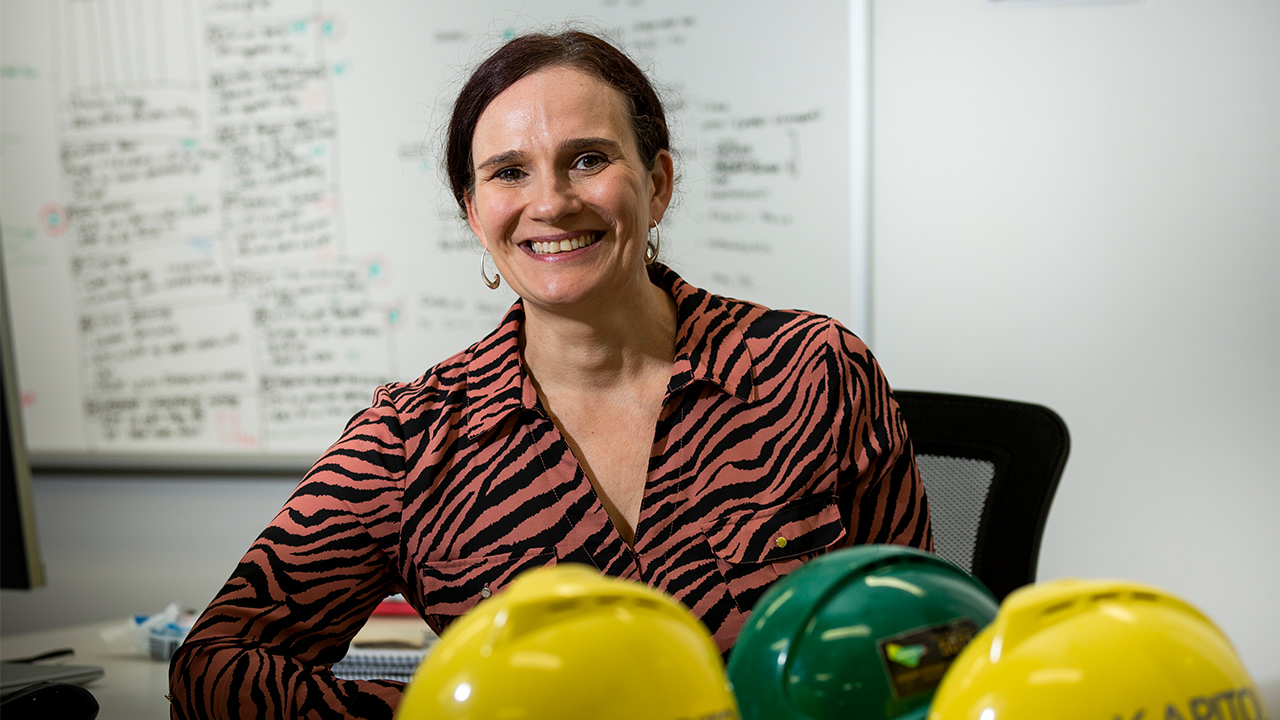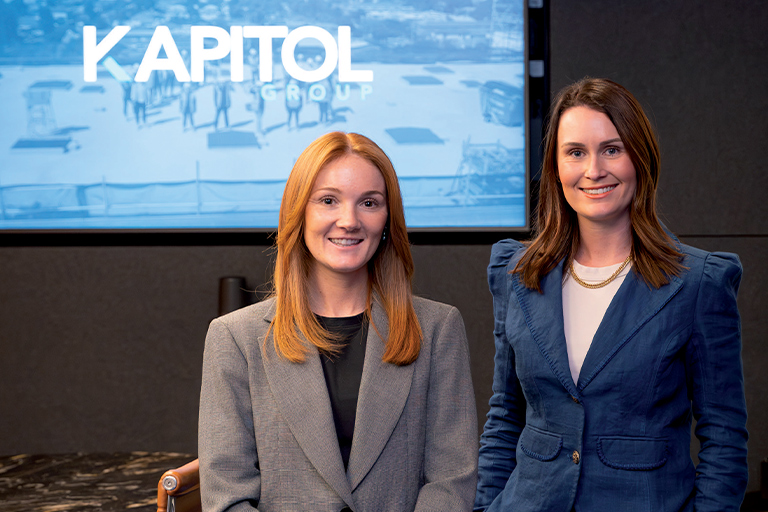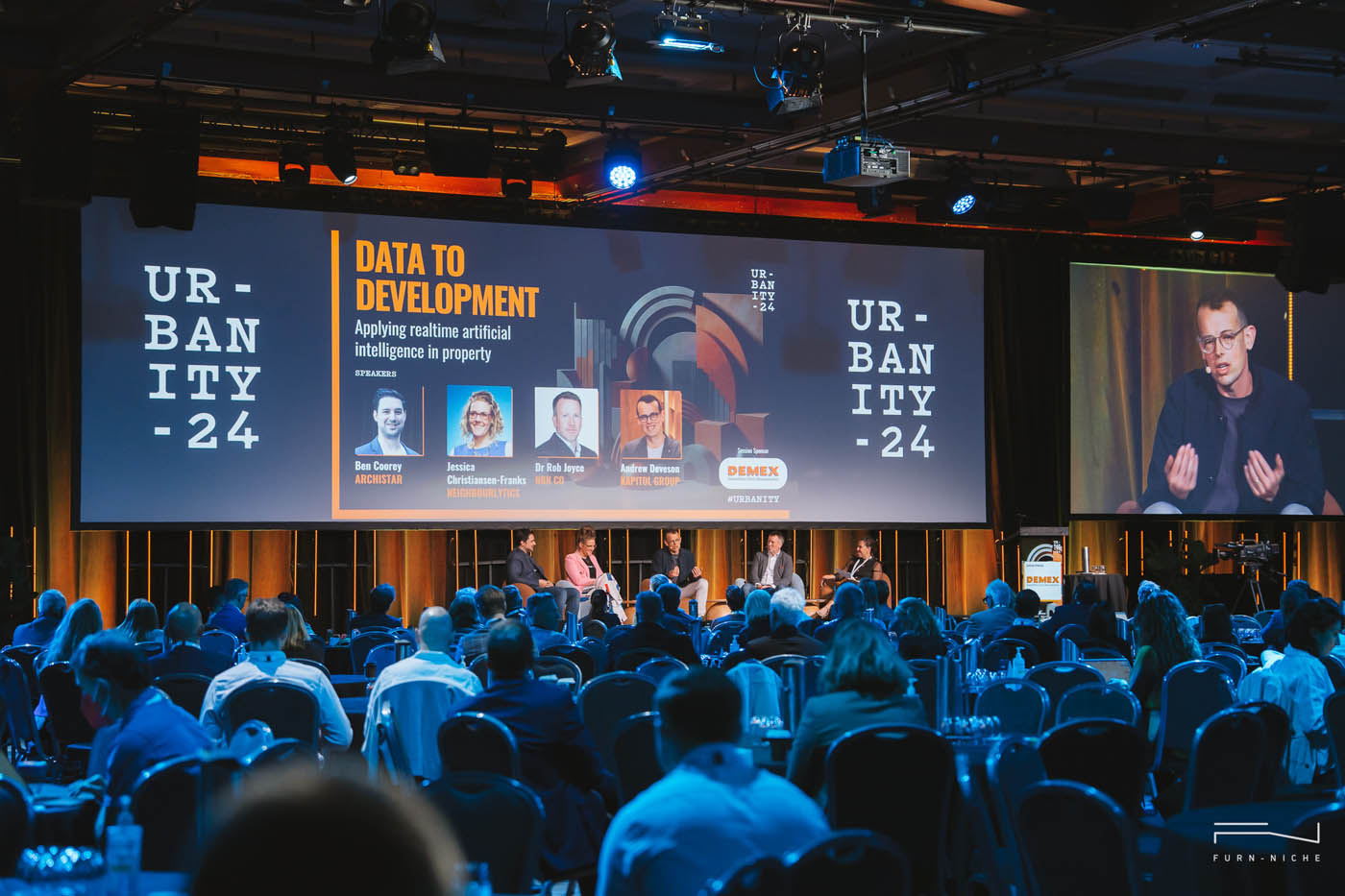
Share this story
Kapitol are proud to have our Head of People & Culture, Alice Hanna's opinion piece on the need for action over words to improve female representation in construction, featured in the Australian Financial Review.
Read the article in the AFR here or see the full transcript of Alice's article below.
Here are three conversations I had that particularly challenged me.
I’d like to challenge this by asking: “Why is it largely only women who have two jobs?”
Women still disproportionately shoulder the brunt of unpaid family and carer responsibilities in Australia. Why? And what can we do to balance that?
The issues many women face would reduce quickly if all genders faced the difficulties associated with “having two jobs”, including (but certainly not limited to) a lack of flexibility, career trajectories handbrakes from career breaks, parental leave redundancies and lower superannuation and salary handbrakes due to career breaks.
Unfortunately, in the construction sector, the majority of the senior decision-makers are still male, with only 17 per cent of managers being female according to the latest Workplace Gender Equality Agency report. The same report confirms construction is one of the lowest percentages of industry offering paid primary carer’s leave at 47 per cent.
How can we get the decision-makers to share the load? In Scandinavia, parental leave has a proportion of “use it or lose it” for each parent.
This means to qualify for the full government-paid parental leave benefit, both parents must take a break from work. This has had wide-ranging benefits, including breaking some social norms surrounding who shoulders the family responsibilities, along with increased flexibility and less impact from career breaks on career trajectories.
The Grattan Institute has recommended a similar model which I recommend we pursue further. I guarantee more flexibility will be introduced as soon as everyone needs it.
Companies can push this forward with balanced parental leave policies, along with challenging the norms that it must be the woman who takes the career break.
One disappointing comment I heard was: “It won’t work because the person with the higher salary has to be the one who goes back to work,” highlighting how normalised our gender pay gap has become. So, guess what? Breaking many of these social norms will help with the gender pay gap … so it’s not always the woman who is earning less.
On one hand, yes, we need sponsorship and mentorship. But let’s think bigger. If you’re an ally, especially in a position of decision-making or influence, use that leverage to demand change. This helps many women, not just the one woman you sponsor.
In construction, where 7am is considered late, seeing a senior person arrive at 9am saying “I dropped my kids off” is a breath of fresh air.
Role model the above – pick up your kids from school a few days a week to normalise the sharing of family responsibilities, speak to your family about how you can shoulder some of that load and talk to your workplace to normalise that everyone wants and needs this.
Our operations manager drops his kids at school a few days a week and leaves early for the sports run. It’s had a big impact on others seeing someone in such a senior position show it’s actually OK to take that flexibility.
In construction, where a 7am start is almost considered late, seeing a senior person arrive at 9am saying “I dropped my kids off” is a breath of fresh air.
Vote with your feet. Choose employers with good flexibility practices, balanced parental leave policies and respectful environments for women. If great talent is demanding this, employers will have to catch up or they’ll lose talent and find it harder to source.
Do this even if it’s not you who needs those programs. Not all of us have or want kids, but all of us want to see change in the industry.
I challenge that.
At Kapitol Group, we’ve implemented a five-day working week for all staff.
All positions except site managers have a Monday to Friday schedule. Site managers work 10 days in a 14-day cycle, resulting in an average of five workdays per week, including alternate Saturdays.
How do we do this when the EBA hasn’t changed? Through strategic planning where Saturday work doesn’t require our whole site team, having a large pool of trained temps to cover our staff and a constant focus on enhancing processes to be more efficient so fewer hours are required overall.
Admittedly, this is both time-consuming and expensive. Having temp staff on all 13 of our sites every week amounts to hundreds of thousands of dollars a year. You might think ‘we can’t afford that’, but actually, you can’t afford not to.
Monumental benefits include attracting staff, higher staff retention, and less fatigued staff – all of which save costs and time to the business. The return on investment is clear.
Onto the “hard” part of the equation. Yes, it’s hard. We’re not perfect with either program (yet). But nothing as complex as the gender disparity and workforce participation issues in construction was ever solved by anything EASY. We need to do the hard things to crack the code on this.
Read the article in the AFR here or see the full transcript of Alice's article below.
Why women in construction are skeptical of words over action
International Women’s Day this year coincided with a report on the major shortfall of construction workers in Victoria. Over the last few weeks, I’ve found myself inspired by amazing women driving change, cynical of words over actions, and disheartened by so much activity in both workforce participation results and the gender pay gap in the construction industry.Here are three conversations I had that particularly challenged me.
Accommodating family needs
Recently I heard that “Women have two jobs. We need to accommodate for that”.I’d like to challenge this by asking: “Why is it largely only women who have two jobs?”
Women still disproportionately shoulder the brunt of unpaid family and carer responsibilities in Australia. Why? And what can we do to balance that?
The issues many women face would reduce quickly if all genders faced the difficulties associated with “having two jobs”, including (but certainly not limited to) a lack of flexibility, career trajectories handbrakes from career breaks, parental leave redundancies and lower superannuation and salary handbrakes due to career breaks.
Unfortunately, in the construction sector, the majority of the senior decision-makers are still male, with only 17 per cent of managers being female according to the latest Workplace Gender Equality Agency report. The same report confirms construction is one of the lowest percentages of industry offering paid primary carer’s leave at 47 per cent.
How can we get the decision-makers to share the load? In Scandinavia, parental leave has a proportion of “use it or lose it” for each parent.
This means to qualify for the full government-paid parental leave benefit, both parents must take a break from work. This has had wide-ranging benefits, including breaking some social norms surrounding who shoulders the family responsibilities, along with increased flexibility and less impact from career breaks on career trajectories.
The Grattan Institute has recommended a similar model which I recommend we pursue further. I guarantee more flexibility will be introduced as soon as everyone needs it.
Companies can push this forward with balanced parental leave policies, along with challenging the norms that it must be the woman who takes the career break.
One disappointing comment I heard was: “It won’t work because the person with the higher salary has to be the one who goes back to work,” highlighting how normalised our gender pay gap has become. So, guess what? Breaking many of these social norms will help with the gender pay gap … so it’s not always the woman who is earning less.
What allies can do
One question continuously posed is what male allies can do for women. The response is often “sponsor a woman and support her career”.On one hand, yes, we need sponsorship and mentorship. But let’s think bigger. If you’re an ally, especially in a position of decision-making or influence, use that leverage to demand change. This helps many women, not just the one woman you sponsor.
In construction, where 7am is considered late, seeing a senior person arrive at 9am saying “I dropped my kids off” is a breath of fresh air.
Role model the above – pick up your kids from school a few days a week to normalise the sharing of family responsibilities, speak to your family about how you can shoulder some of that load and talk to your workplace to normalise that everyone wants and needs this.
Our operations manager drops his kids at school a few days a week and leaves early for the sports run. It’s had a big impact on others seeing someone in such a senior position show it’s actually OK to take that flexibility.
In construction, where a 7am start is almost considered late, seeing a senior person arrive at 9am saying “I dropped my kids off” is a breath of fresh air.
Vote with your feet. Choose employers with good flexibility practices, balanced parental leave policies and respectful environments for women. If great talent is demanding this, employers will have to catch up or they’ll lose talent and find it harder to source.
Do this even if it’s not you who needs those programs. Not all of us have or want kids, but all of us want to see change in the industry.
‘We can’t change until…’
Two barriers to women’s workforce participation in the construction industry are the standard six-day work week and big hours. I’ve heard a lot of “We can’t move to five days until the union changes the EBA”.I challenge that.
At Kapitol Group, we’ve implemented a five-day working week for all staff.
All positions except site managers have a Monday to Friday schedule. Site managers work 10 days in a 14-day cycle, resulting in an average of five workdays per week, including alternate Saturdays.
How do we do this when the EBA hasn’t changed? Through strategic planning where Saturday work doesn’t require our whole site team, having a large pool of trained temps to cover our staff and a constant focus on enhancing processes to be more efficient so fewer hours are required overall.
Admittedly, this is both time-consuming and expensive. Having temp staff on all 13 of our sites every week amounts to hundreds of thousands of dollars a year. You might think ‘we can’t afford that’, but actually, you can’t afford not to.
Monumental benefits include attracting staff, higher staff retention, and less fatigued staff – all of which save costs and time to the business. The return on investment is clear.
Onto the “hard” part of the equation. Yes, it’s hard. We’re not perfect with either program (yet). But nothing as complex as the gender disparity and workforce participation issues in construction was ever solved by anything EASY. We need to do the hard things to crack the code on this.
Latest News

The Urban Developer Article | Melbourne’s $1bn ‘Solar Highrise’ Leads Way to Office Future
Andrew Deveson, recently spoke with The Urban Developer about our role in redefining Melbourne’s CBD.

Green Review Feature | Ushering Sustainable Progress in Construction
Our ESG team were interviewed by Green Review to discuss how we're reducing our environmental impact through design and material choices.

The Urban Developer Article | An ‘Over-Confident Intern’ but AI Exceeding Expectations
In an article written in The Urban Developer, Kapitol's Director Andrew Deveson discusses how much the construction industry is ripe for disruption and change from AI and innovation. The discussion was part of a panel discussion at the 2024 Urbanity Summit entitled 'Data to Development -applying real time AI in property.'
